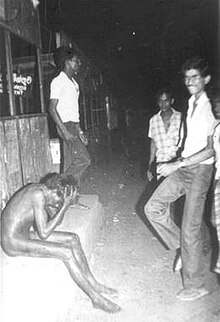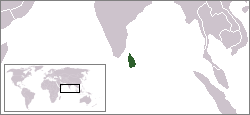Black July
| Black July | |
|---|---|
| Part of Riots in Sri Lanka | |

A Tamil youth stripped naked by Sinhalese rioters near Borella bus stand.
|
|

Location of Sri Lanka
|
|
| Location | Sri Lanka |
| Date | 24 July 1983 – 30 July 1983 (UTC+6) |
| Target | Primarily Sri Lankan Tamils |
|
Attack type
|
Burning, decapitation, stabbing, shooting |
| Weapons | Axes, guns, explosives, knives, sticks |
| Deaths | 400-3,000 |
|
Non-fatal injuries
|
25,000+ |
| Victims | Tamil civilians |
|
Number of participants
|
Thousands |
Black July (Tamil: கறுப்பு யூலை, translit. Kaṟuppu Yūlai; Sinhalese: කළු ජූලිය Kalu Juliya) is the common name used to refer to the anti-Tamil pogrom and riots in Sri Lanka during July 1983. The riots began as a "response" to a deadly ambush on 23 July 1983 by the Liberation Tigers of Tamil Eelam, a Tamil militant group, that killed 13 Sri Lanka Army soldiers. Beginning in the capital Colombo on the night of 24 July 1983, anti-Tamil pogroms spread to other parts of the country. Over seven days, mobs, mainly Sinhalese, attacked Tamil targets, burning, looting, and killing. Estimates of the death toll range between 400 and 3,000. 8,000 homes and 5,000 shops were destroyed. 150,000 people were made homeless. The economic cost of the riots was $300 million. A wave of Sri Lankan Tamils fled to other countries in the ensuing years and many thousands of Tamil youths joined militant groups.
Black July is generally seen as the start of full-scale Sri Lankan Civil War between the Tamil militants and the government of Sri Lanka. July has become a time of remembrance for the Sri Lankan Tamil diaspora community around the world.
During the colonial period, many Sri Lankan Tamils, particularly those from the Jaffna peninsula, took advantage of educational facilities established by missionaries. They were also benefited by the British policy of divide and rule, which placed minorities in positions of power in colonies and soon dominated the civil service and other professions. When Sri Lanka became independent in 1948, a majority of government jobs were held by Tamils, who were a minority of the country's population. The elected leaders saw this as the result of a British stratagem to control the majority Sinhalese, and they deemed it a situation that needed correction.
...
Wikipedia
